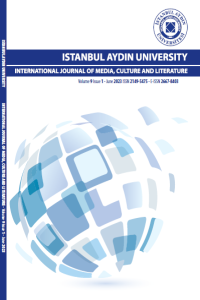Abstract
References
- Collins, S. (2008). The Hunger Games. Pp. 141-142.
- Collins, S. (2009). Catching Fire. p. 100
- Claeys, G. (Ed). (2010). The Cambridge Companion of Utopian Literature. Cambridge University Press. 5-157.
- E. James, F. Mendlesohn. (Ed). (2003). The Cambridge Companion to Science Fiction. Cambridge University Press. 16-37.
- E. James, F. Mendlesohn. (Ed). (2012) The Cambridge Companion to Fantasy Literature.
- Cambridge University Press. Pp10:292.
- Todorov, T. (1973). Introduction la literature fantastique. The Press of Case Western Reserve University Cleveland, London.
- Burke, B. (2015). “Reaping” Environmental Justice through Compassion in The Hunger Games. Interdisciplinary Studies in Literature and Environment, 22(3), 544–567. Retrieved 20, September 2023. https:// www.jstor.org/stable/26569584
- Bereit, V. F. (1969). The Genre of Science Fiction. Elementary English, 46(7), 895–900. Retrieved 29, September 2023. http://www.jstor.org/ stable/41386588
- Curwood, J. S. (2013). “The Hunger Games”: Literature, Literacy, and Online Affinity Spaces. Language Arts, 90(6), 417–427. Retrieved 20, September 2023. http://www.jstor.org/stable/24575002
- Jones, C. E. (2016). Changing the World: Faces of Rebellion in Suzanne Collins’s Hunger Games Trilogy. Journal of the Fantastic in the Arts, 27(2 (96)), 225–247. Retrieved 26, September 2023. http://www.jstor.org/ stable/26321202
- Stoner, P. (2017). “Dystopian Literature: Evolution of Dystopian Literature From We to the Hunger Games”. Merge The W’s Undergraduate Research Journal. 1-30. Retrieved 24, September 2023. https://athenacommons. muw.edu/merge/vol1/iss1/4/
- Suvin, D. (1979). Metamorphoses of Science Fiction: On the Poetics and History of a Literary Genre. New Haven Yale University Press. 49-567. Retrieved 20, September 2023.
The Genre Merge of Fiction and Dystopian Science Fiction: Suzanne Collins The Hunger Games and Catching Fire
Abstract
By examining elements of science fiction, utopian literature, and dystopian settings, this article sets out to explore whether The Hunger Games and Catching Fire can be well categorized as suggested by Peter Fitting in which he used Darko Suvin conclusion in the article “Utopia, dystopia and science fiction “ gathered by Gregory Claeys in the book The Cambridge Companion of Utopian Literature (2010) as wither it stands upon a certain genera or shifts towards a merge between genres. This article investigates the genre classification of Suzanne Collins' famous series, The Hunger Games and Catching Fire, it starts by exploring the definitions of science fiction and fantastic literature, using Todorov's book Introduction la literature fantastique attempting to draw a framework-specific genre such as Si-fi, fantastic, etc. Science fiction offers speculative but conceivable ideas, fantastic literature usually presents the impossible, hence this article dives into the utopian literature genre, as The Hunger Games and Catching Fire novels present a clear divide between the utopian Capitol and the dystopian districts. It explains the characteristics of utopia, such as an idealized society, clarity of imagination, political influence, and reaction to the present, are considered since it seems problematic to define the genres on their own. Since they overlap between different commodities this creates the problem mentioned above as to how to categorize The Hanger Games and Catching Fire. By using several academic perspectives but mainly Todorov's and Fitting’s explanation this results in the examination of the interaction between science fiction and utopian literature. Proposing that utopia may be a sub-genre of science fiction. It searches into the characteristics of science fiction, emphasizing its basis in factual research and
technological possibilities. Thus science fiction contrasts with fantasy literature, highlighting the balance between reality and fantasy within the former. Science fiction authors, such as Suzanne Collins, draw inspiration from contemporary issues to imagine future outcomes, and The Hunger Games and Catching Fire are a prime example of this practice.
References
- Collins, S. (2008). The Hunger Games. Pp. 141-142.
- Collins, S. (2009). Catching Fire. p. 100
- Claeys, G. (Ed). (2010). The Cambridge Companion of Utopian Literature. Cambridge University Press. 5-157.
- E. James, F. Mendlesohn. (Ed). (2003). The Cambridge Companion to Science Fiction. Cambridge University Press. 16-37.
- E. James, F. Mendlesohn. (Ed). (2012) The Cambridge Companion to Fantasy Literature.
- Cambridge University Press. Pp10:292.
- Todorov, T. (1973). Introduction la literature fantastique. The Press of Case Western Reserve University Cleveland, London.
- Burke, B. (2015). “Reaping” Environmental Justice through Compassion in The Hunger Games. Interdisciplinary Studies in Literature and Environment, 22(3), 544–567. Retrieved 20, September 2023. https:// www.jstor.org/stable/26569584
- Bereit, V. F. (1969). The Genre of Science Fiction. Elementary English, 46(7), 895–900. Retrieved 29, September 2023. http://www.jstor.org/ stable/41386588
- Curwood, J. S. (2013). “The Hunger Games”: Literature, Literacy, and Online Affinity Spaces. Language Arts, 90(6), 417–427. Retrieved 20, September 2023. http://www.jstor.org/stable/24575002
- Jones, C. E. (2016). Changing the World: Faces of Rebellion in Suzanne Collins’s Hunger Games Trilogy. Journal of the Fantastic in the Arts, 27(2 (96)), 225–247. Retrieved 26, September 2023. http://www.jstor.org/ stable/26321202
- Stoner, P. (2017). “Dystopian Literature: Evolution of Dystopian Literature From We to the Hunger Games”. Merge The W’s Undergraduate Research Journal. 1-30. Retrieved 24, September 2023. https://athenacommons. muw.edu/merge/vol1/iss1/4/
- Suvin, D. (1979). Metamorphoses of Science Fiction: On the Poetics and History of a Literary Genre. New Haven Yale University Press. 49-567. Retrieved 20, September 2023.
Details
| Primary Language | English |
|---|---|
| Subjects | World Languages, Literature and Culture (Other) |
| Journal Section | Research Article |
| Authors | |
| Publication Date | May 1, 2024 |
| Submission Date | December 26, 2023 |
| Acceptance Date | February 26, 2024 |
| Published in Issue | Year 2023 Volume: 9 Issue: 1 |
All site content, except where otherwise noted, is licensed under a Creative Common Attribution Licence. (CC-BY-NC 4.0)



